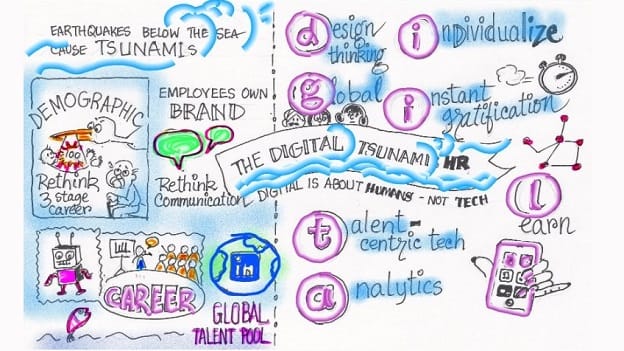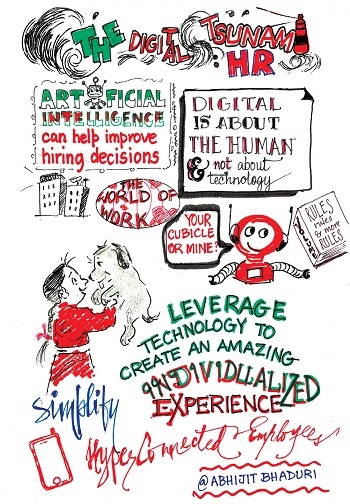The digital tsunami in HR

Companies that have been born digital are overtaking companies that have existed for decades
Those who learn to work WITH machines will thrive & HR will certainly need to learn to work with robots who will be part of every workforce
I look at the latest occupant of my office space. He is Newton, a chatbot. That means he/she/it is a computer program designed to simulate conversations with human users. There is a camera, a motion sensor and a computer that is hidden behind this human form. Newton engages in some light social banter with me to put me at ease. Then asks me some questions to test my awareness and understanding of the new policies we have introduced. I am a participant in an experiment HR is running on how to use chatbots to judge the mood of the employee. Newton understands our natural language and hence is easy to talk to. I could easily think of using Newton to answer questions on policies or do short surveys in real time. People stop and patiently respond to Newton’s questions fairly candidly. The chatbot uses artificial-intelligence software to remember details from previous discussions and mines the web for question-and-answer style conversations.
Artificial Intelligence
When Microsoft, China created the chatbot Xiaoice, they did not anticipate how big a hit the bot would be. Millions of young Chinese pick up their smartphones every day to exchange messages with her, drawn to her knowing sense of humor and listening skills. People often turn to her when they have a broken heart, have lost a job or have been feeling down.
In recruiting, Artificial Intelligence (AI) is helping make better shortlists of potential candidates. AI algorithms creates personal profiles of candidates and extracts insights about whether they would be a good match for a job, even if they're not actively searching for a new one. By using predictive analytics to evaluate candidate interview videos, HireVue filters candidates on factors like word choices and even facial expressions and match these variants to outcomes—such as who was eventually hired for which position. As the number of data points increases, the algorithm’s ability to filter through mountains of resumes to present a few candidates improves. AI does what recruiters are not good at i.e. sifting through resumes. That leaves recruiters just the task of finding the cultural fit.
The digital world is changing organizations faster than ever before. In the past five years, our new ecosystem that has changed much more because of technology —virtual reality, live video, artificially intelligent news bots, instant messaging and chat apps. The world of work is changing rapidly.

Scale and Speed
Companies that have been born digital are overtaking companies that have existed for decades. Airbnb (started in 2008) is valued at more than $25bn. That makes them bigger than Hyatt ($9bn), Intercontinental or Accor or Wyndham (approximately $11bn each) and in the same league as Marriott ($23bn) or a Hilton ($28bn).
Apple, Alphabet, Microsoft and Facebook generate more than $2,000 in combined profits every second and $140,000 every minute. Alibaba sold goods worth $14bn in a single day.
Inside the organizations, HR now has the ability to use the web, cloud, social, mobile, video, apps, data and geolocation to engage the employees, the network of consumers, the suppliers, competitors and if possible, every talented person in the world who can collaborate with them. The digital tools make all this possible at almost no cost.
Humans and Machines
Will HR be replaced by chatbots and machines? The answer is nuanced. The machines are not good at understanding shades of emotions, sarcasm, humor etc. Machines are good at doing “mindless” repetitive tasks. These are the tasks that humans can do without giving it any thought. Routine, repetitive tasks that machines can be trained to do more efficiently than humans will be done by machines. But jobs that depend on social skills and involve complex human interactions will stay with humans. Those who learn to work WITH machines will thrive. HR will certainly need to learn to work with robots who will be part of every workforce.
That is not something radically new. We already do that a lot. We carry the power of artificial intelligence in our pocket and use it to get directions when we travel to unknown locations. Our photos get tagged by Facebook. We ask Siri questions we need looking up.
Artificial Intelligence algorithms are getting standardized and made available for free. HR can start leveraging AI to get insights about the workplace that was not possible before. How can the digital tsunami be harnessed by HR?
Simplify Information Access
A chatbot can provide answers to routine questions that employees may have about policies and even job postings. The bot can tell the job applicant in real time what skills they are missing that they need to build up to get the dream job they aspire for. The chatbots can help in training people because they do not get frustrated when they have to repeat the same instruction for the five hundredth time.
Engaging the Employees
Getting the employees to create content that is made available on the intranet or the internal social network can be a very powerful engagement tool. Being able to have access-on-tap to content created by the leaders can change the way the leaders shape culture. The leaders may have to learn to create content that captures the employees’ imagination. Even in the digital world, content is still the king.
Individualize
Think of the choice that AirBnB can offer to a traveler compared to a conventional hotel. Everything from a castle to a single mattress in a dorm is on sale to let the consumer individualize the experience. By using data from multiple sources like demographic data, performance data, activity on internal social network, participation in community activities, the organization can get insights almost at an individual level and individualize everything from benefits to rewards.
Communities
Digital communities can serve as great places to connect and build stuff. HR can run hackathons and open innovation contests by leveraging communities. Participation in the online communities can create a sense of identity and camaraderie in geographically dispersed employee groups.
Digital is not about technology
This is not about technology. It is about reexamining and changing our mindsets, beliefs and forming new habits. Anyone who has tried to stick to New Year resolutions will tell you that it is very hard to change habits.
In the analog world, HR was still sulking about not having a seat at the table; in the digital organizations, they have to take the lead. Creating these changes is all about creating a culture where speed, boundarylessness and innovation are dominant forces. The digital tsunami will not give us the luxury of time.
The Digital Tsunami is the latest book by Abhijit Bhaduri.













